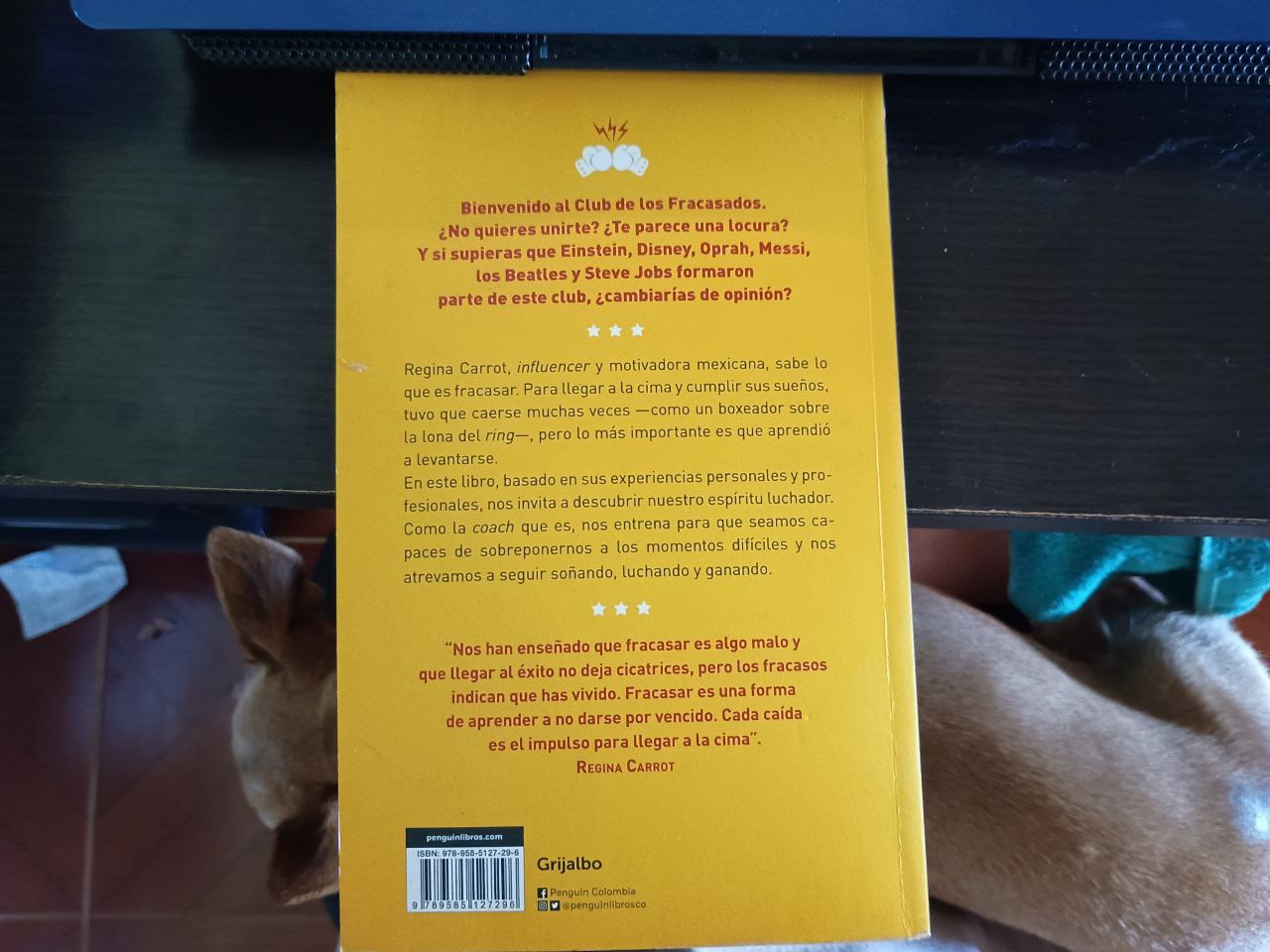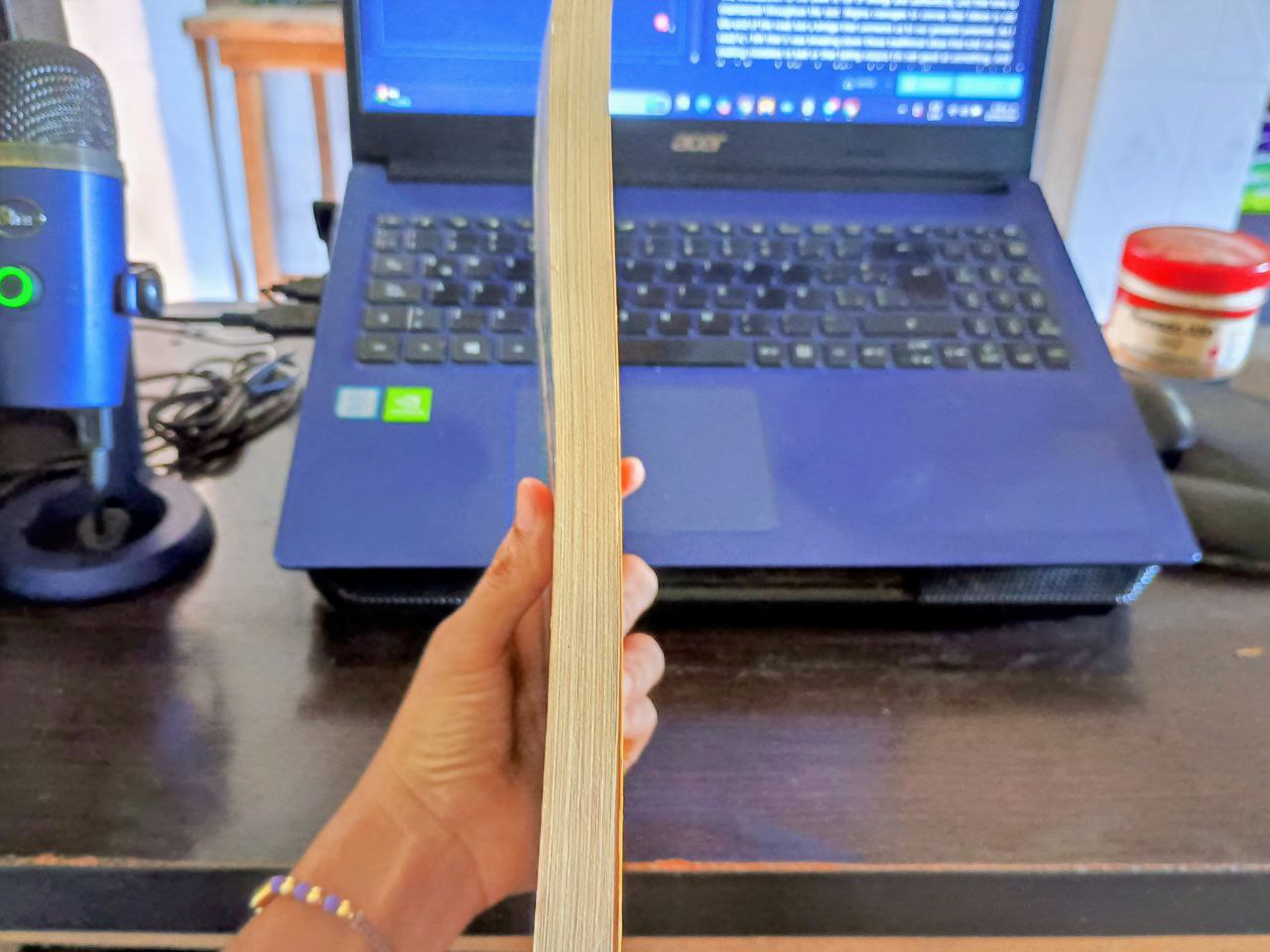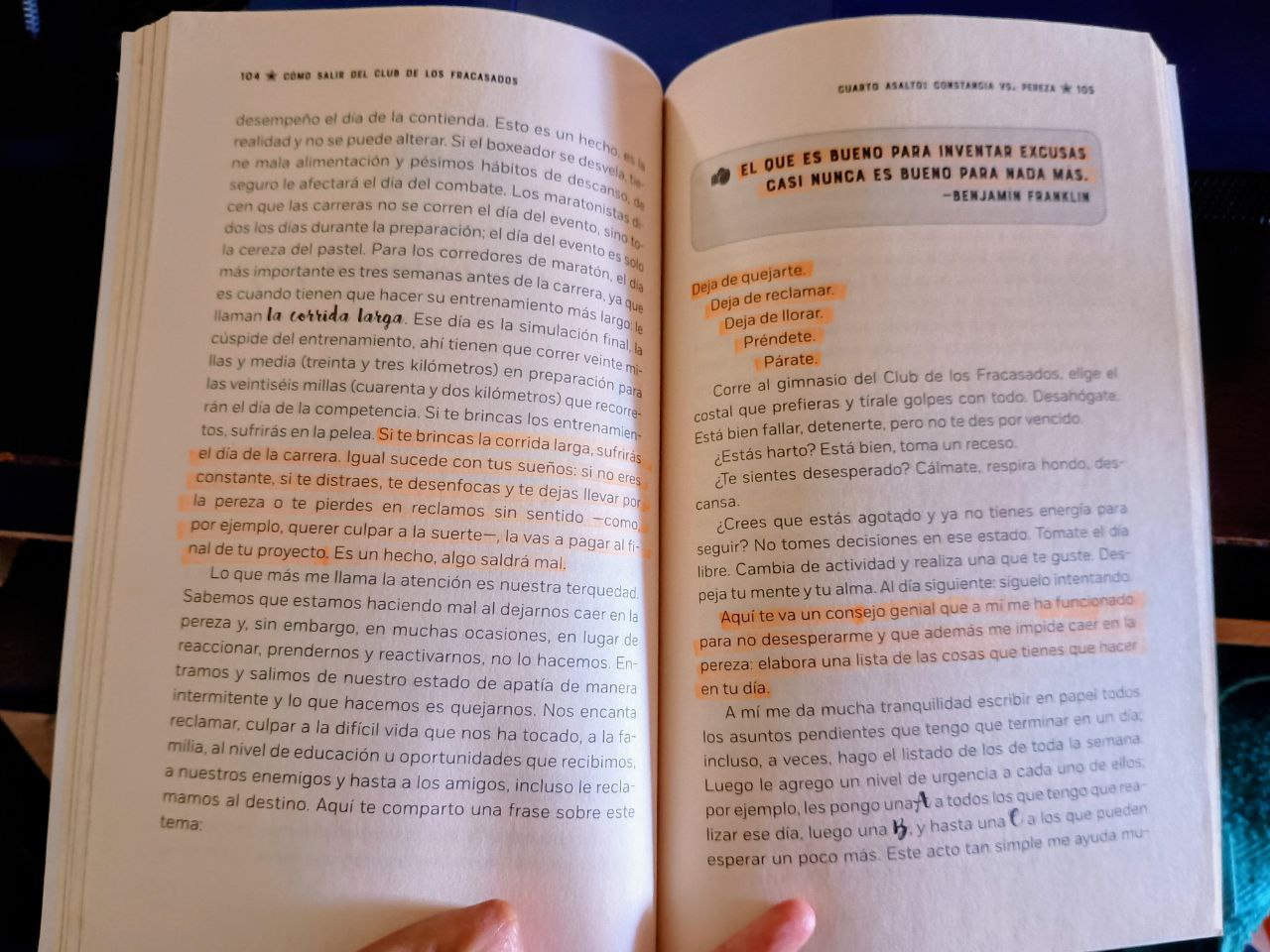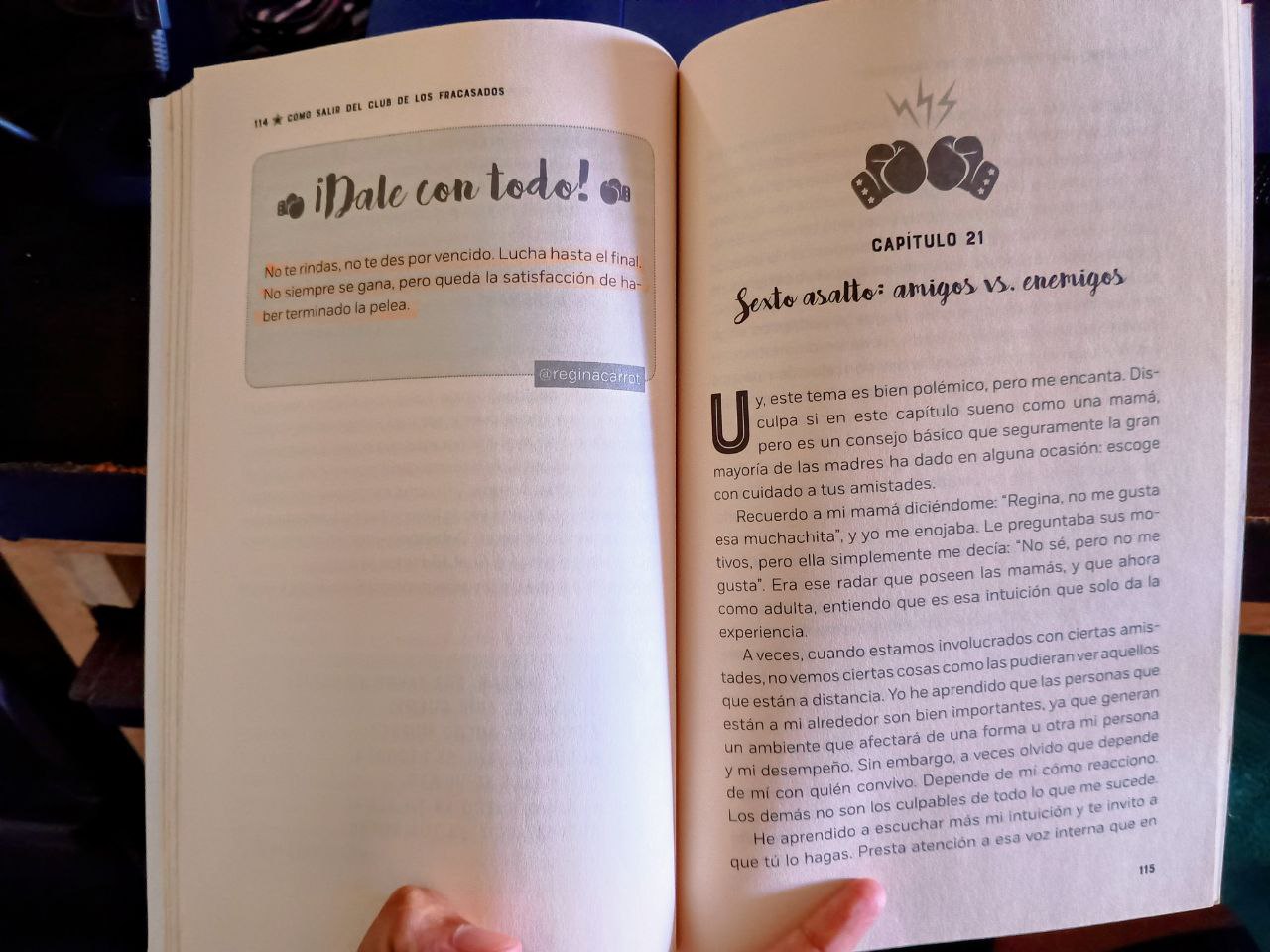

Talking about failure is not easy. Society has often taught us to hide it, to feel ashamed, or to think that it is synonymous with weakness. However, Regina Carrot, in her book How to Leave the Losers' Club, invites us to look at that word from another perspective: as a natural and necessary stage on the path to personal and professional growth. What is most striking is the intimate way in which the author speaks to us, as if she were sitting in front of us telling us about her own struggles and making us feel that we are not the only ones who have gone through painful setbacks.
---
>! [Spanish]
>Hablar de fracaso no es sencillo. Muchas veces la sociedad nos ha enseñado a ocultarlo, a sentir vergüenza o a pensar que es sinónimo de debilidad. Sin embargo, Regina Carrot en su libro Cómo salir del club de los fracasados nos invita a mirar esa palabra desde otra perspectiva: como una etapa natural y necesaria en el camino hacia el crecimiento personal y profesional. Lo que más impacta es la forma cercana en la que la autora nos habla, como si estuviera sentada frente a nosotros contándonos sus propias batallas y haciéndonos sentir que no somos los únicos que hemos pasado por caídas dolorosas.
---

In her pages, the author does not seek to disguise reality or sell quick formulas for success. On the contrary, her intention is to focus on the human aspect, on the imperfect and vulnerable nature of failure. Failure becomes a learning opportunity, a sign that we are trying and, above all, a reminder that there are no true achievements without previous setbacks. This approach is refreshing, because motivational books usually talk about goals, dreams, and results, but few dare to highlight the falls that are part of the process.
The introduction to the book is full of energy and authenticity, and that tone is maintained throughout the text. Regina manages to convey that failure is not the end of the road, but a bridge that connects us to our greatest potential. As I read it, I felt that it was breaking down those traditional ideas that told me that making mistakes is bad or that failing means I'm not good at something. And therein lies much of the value of this work: in changing the way we understand failure and empowering us to use it to our advantage.
---
>! [Spanish]
>En sus páginas, la autora no busca disfrazar la realidad ni vender fórmulas rápidas de éxito. Al contrario, se nota la intención de aterrizar en lo humano, en lo imperfecto y en lo vulnerable que es caer. El fracaso se convierte en un espacio de aprendizaje, una señal de que estamos intentándolo y, sobre todo, un recordatorio de que no hay logros verdaderos sin tropiezos previos. Este enfoque es refrescante, porque generalmente los libros de motivación hablan de metas, de sueños y de resultados, pero pocos se atreven a poner en primer plano las caídas que son parte del proceso.
La introducción del libro está cargada de energía y autenticidad, y ese tono se mantiene a lo largo de todo el texto. Regina logra transmitir que el fracaso no es el final del camino, sino un puente que nos conecta con nuestro potencial más grande. Al leerla, sentí que estaba derrumbando esas ideas tradicionales que me decían que equivocarse es malo o que fallar significa que no sirvo para algo. Y ahí radica gran parte del valor de esta obra: en cambiar la manera en la que entendemos el fracaso y en empoderarnos para usarlo a nuestro favor.
---

Spoiler Alert
The heart of this book revolves around the idea that failure is not a destination, but a passing phase. Regina shares her own anecdotes, showing that behind every achievement there were rejections, mistakes, and moments of uncertainty. What's interesting is that she doesn't just recount her failures, but analyzes them and turns them into practical lessons that anyone can apply.
A central theme is habits. The author insists that getting out of the “failure club” does not depend only on having motivation or dreaming big, but on the small habits we build every day. Changing the way we talk to ourselves, surrounding ourselves with people who encourage us instead of holding us back, and daring to try again and again are pillars that are repeated throughout the book. In fact, one of the most powerful messages is that discipline in habits can be more transformative than talent itself, because it is what sustains our ability to get back up after every setback.
---
>! [Spanish]
>Alerta Spoiler
El corazón de este libro gira en torno a la idea de que fracasar no es un destino, sino una estación de paso. Regina comparte anécdotas propias en las que muestra que detrás de cada logro hubo rechazos, errores y momentos de incertidumbre. Lo interesante es que no se limita a contar sus caídas, sino que las analiza y las convierte en enseñanzas prácticas que cualquiera puede aplicar.
Un tema central son los hábitos. La autora insiste en que salir del “club de los fracasados” no depende solo de tener motivación o de soñar en grande, sino de los pequeños hábitos que construimos cada día. Cambiar nuestra forma de hablar con nosotros mismos, rodearnos de personas que nos impulsen en lugar de frenarnos, y atrevernos a intentar una y otra vez, son pilares que se repiten en el libro. De hecho, uno de los mensajes más potentes es que la disciplina en los hábitos puede ser más transformadora que el talento mismo, porque es lo que sostiene nuestra capacidad de volver a levantarnos tras cada tropiezo.
---

In addition, the book makes us reflect on how we tend to compare ourselves to others and forget that behind every success story there is a long list of hidden failures. That comparison leads us to think that we are the only ones who fail, when in reality everyone has been there. At this point, Regina reminds us that even the people we admire—artists, entrepreneurs, leaders—once felt defeated, and what sets them apart is that they did not remain stuck in that identity of failure.
---
>! [Spanish]
>Además, el libro nos hace reflexionar sobre cómo solemos compararnos con los demás y olvidar que detrás de cada historia de éxito hay una larga lista de fracasos ocultos. Esa comparación nos lleva a pensar que somos los únicos que fallamos, cuando en realidad todos han pasado por ahí. En este punto, Regina nos recuerda que hasta las personas que admiramos —artistas, empresarios, líderes— alguna vez se sintieron derrotados, y lo que los diferencia es que no se quedaron estancados en esa identidad de fracasados.
---

What I think of the book
Reading How to Leave the Losers Club was like opening a window to a new way of understanding my own failed attempts. I had always seen failure as a sign of weakness, but this book taught me that it is actually a testament to courage: failing means that I dared to try, that I took a step when others preferred to remain immobile.
What I liked most is that it doesn't feel like a book that judges you, but rather like an empathetic companion. The examples are clear, the advice is practical, and I found the emphasis on habits to be fundamental, because it's those small daily changes that make the difference between staying in the same place or moving forward with more strength.
This book left me with the certainty that I am not alone in my failures and that every attempt, even if it doesn't turn out as I expected, brings me a little closer to my best self. Without a doubt, I recommend this book to anyone who has felt that their efforts are not worthwhile, because in the end, failure is not the enemy: it is the teacher that prepares us for success.
---
>! [Spanish]
>Lo que pienso del libro
Leer Cómo salir del club de los fracasados fue como abrir una ventana a una nueva manera de entender mis propios intentos fallidos. Siempre había visto el fracaso como una marca de debilidad, pero este libro me enseñó que en realidad es un testimonio de valentía: fallar significa que me atreví a intentarlo, que di un paso cuando otros prefirieron quedarse inmóviles.
Lo que más me gustó es que no se siente como un libro que te juzga, sino como un acompañamiento lleno de empatía. Los ejemplos son claros, los consejos son prácticos y la insistencia en los hábitos me pareció fundamental, porque son esos pequeños cambios diarios los que marcan la diferencia entre quedarse en el mismo lugar o salir adelante con más fuerza.
Este libro me dejó la certeza de que no estoy sola en mis caídas y que cada intento, aunque no salga como lo esperaba, me acerca un poco más a mi mejor versión. Sin duda, una lectura que recomiendo a cualquiera que haya sentido que sus esfuerzos no valen la pena, porque al final, el fracaso no es el enemigo: es el maestro que nos prepara para el éxito.
Recursos - Resources
! [Spanish] Traductor utilizado Deepl.com versión gratuita las imágenes fueron tomadas por mi con mi celular huawei y9s miniatura editada en canva Enlace
! [English] Used translator Deepl.com free photos taken with my huawei y9s cell phone thumbnail edited in canva link